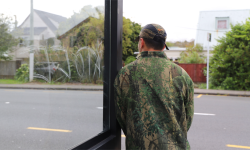[{"id":1869,"order":0,"imagePath":"https://admin.ezystream.com/static/images/article/b97a6fa3-bba0-4a32-ae35-097a0142048f.png","type":"image","content":"https://admin.ezystream.com/static/images/article/b97a6fa3-bba0-4a32-ae35-097a0142048f.png"},{"id":1870,"order":1,"contentText":"Recently, John Tucker, Principal of our theological college (Carey Baptist College) received an email from one of the leaders in our movement of churches, asking if some of the teaching staff at Carey would reflect on the question of how churches might respond to vaccine mandates.
The email talked about churches that are running in-person worship services for those who have been vaccinated. This is causing real pain for many people in our churches who arenu2019t vaccinated, along with a sense of disconnection, abandonment and discrimination. He talked about other churches that have taken a very different approach, choosing not to meet in person again until everyone is able to attendu2014both vaccinated and unvaccinated alike. He asked, are there any biblical and theological principles that might guide our churches and pastors as they navigate these difficult choices?
Here is one response, from our wonderful mission specialist, George Wieland:
Thanks for your email.
These are very challenging issues, taking us beyond anything we might have expected to be responding to, and leading in, before the pandemic changed the contexts of ministry and mission. I pray often for you and our other leaders as pastors and others turn to you for guidance in relation to the questions and tensions that are being experienced.
Most churches find themselves trying to respect and care for several categories of people at once. There are those who are vaccinated (either gratefully or reluctantly), those who are unvaccinated (either for medical or other compelling reasons beyond their control or by choice and/or personal conviction), and others who are vaccinated but still particularly vulnerable should they catch COVID-19. Among the vaccinated will be those who are happy to mingle with people who have not been vaccinated as well as some who donu2019t feel safe in a mixed environment. Across all groups there will be a range of attitudes to the other groups, from empathy and respect and a desire to remain in relationship with them, to dismissal of their views and judgment on their actions.
There is hurt on all sides. Iu2019m sure youu2019re hearing the full range, from u201cWhy is our church discriminating against us because of our personal choices?u201d to u201cWhy do these people insist on putting my children/elderly relatives/immunocompromised friends at greater risk than is necessary, and expect the church to accept that?u201d That range of attitudes is present throughout society but in our church communities there is the added complexity of how to understand Christian faith in relation to these circumstances and issues. For those who believe that their stance is derived from their Christian faith it can be frustrating to hear the case made for a particular approach without what they understand to be a satisfactory biblical basis. So, thank you for asking specifically for biblical and theological perspectives to bring into consideration.
I donu2019t think there is one solution that will be right everywhere or for every church, nor one set of biblical texts or theological convictions that may be resorted to as a ready reference to resolve each of the questions that arises. Each faith community has to find a path through their particular circumstances that they will be able to walk faithfully with their eyes on Jesus, love for the world, and care for one another. We can find in scripture, however, some considerations that could guide local churches as they try to walk through this season (which will pass). Here are some that I have been thinking about.
The u201cweaku201d and the u201cstrongu201d (1 Corinthians 8:1-13; 9:19-23; Romans 14:1-15:13)
There is not an exact equivalence between the issues that divided believers in the house churches of Rome and Corinth that Paul addressed in the first century and those that have arisen among the members of our churches in relation to COVID-19 and the response. What is interesting, however, is that although Paul might well have been expected to arbitrate between competing opinions and provide the definitive judgment on who is right and who is wrong and, accordingly, what each house churchu2019s practice should be, he refuses to do so. Instead, he appeals for mutual acceptanceu2014of the people, not necessarily their opinions, which are neither the basis for nor the focus of their engagement with each other (Romans 14:1). He affirms the role of conscience in guiding behaviour, with two implications: 1. no-one should be compelled to act contrary to their conscience; and 2. no-one is to be dictated to by another personu2019s conscience. Each is to be respected and the goal should be to welcome other believers whose opinions and practice are different with love, respect and consideration.
Itu2019s not entirely clear in Romans who are the u201cweaku201d and who are the u201cstrongu201d that Paul is talking to. Perhaps each group thought they were strong and the others were weak. Perhaps thereu2019s something of that in our context too. Paul shifts the focus from u201cWho is right?u201d to u201cHow, with these differences and tensions, may we genuinely respect and accept others, and what steps could be taken to enable us to do so practically as well as theoretically?u201d For churches in Corinth and Rome it meant adopting a willingness to give up u201crightsu201d in order to take account of the scruples of others, and to honour and serve one another with the goal of living in harmony (not the same as uniformity or complete agreement) based on Christ and with the purpose of glorifying God as a community (Romans 15:5-6).
u201cFreedomu201d (Galatians 5:1; 13-15; 1 Corinthians 9:19-23)
Two aspects of freedom are affirmed. 1. Those who belong to Christ are free, and not subject to human or non-human powers. 2. Those who follow the way of Christ will again and again choose, in freedom, to surrender their rights and instead serve others. Indeed, the one they worship shows them how to live as slaves of others for his sake (Philippians 2:1-11; John 13:1-20). This reframes the question. Instead of, u201cWhy are you denying me my right to come into the church building and participate in worship?u2019 it might be, u201cHow could I best serve those who are anxious about this pandemic and feel they canu2019t risk coming into a gathering unless strong precautions are in place?u201d And, conversely, instead of, u201cWhy are you putting us and the wider community at risk by denying our right to gather and worship with minimal risk?u201d it might be, u201cHow could I best serve those whose circumstances or conscience or opinions do not allow them to accept vaccination?u201d And in both cases, with the accompanying question, u201cAnd how may we continue to accept each other in love and seek the glory of God together?u201d
A health pass in the Gospels (Mark 1:40-45; Luke 5:12-14; 17:11-19)
OK, maybe this one is a bit of a stretch! Iu2019m certainly not suggesting a correspondence between COVID-19 and leprosy, although I have heard a number of people who either are unvaccinated or have COVID-19 say that they do feel that they are being treated like lepers. But Iu2019ve been thinking about those incidents in the Gospels where Jesus heals people who have suffered from leprosy, and then tells them, u201cGo show yourself to the priest, and offer for your cleansing what Moses commanded, as a testimony to themu201d (Mark 1:44, paralleled in Luke 5:14). Why did they have to do that? They already knew that they were well, Jesus himself accepted them, so why did they have to go and follow this community regulation? The reason given is not for them, but for the community, and specifically those who gathered to worship. People with leprosy were excluded from such gatherings, and from society more generally, because of fears of the whole community becoming sick. We now know that such fears were unfounded and the exclusion then and practiced by many other societies since then was cruel and unjust, but the point was that Godu2019s instructions for the functioning of the community included provision for the re-entry into the temple and other aspects of community life of people who had been cured and were now healthy. The process involved getting a certified clear-of-leprosy pass from the relevant authority. This ensured that others in the community could be reassured that they were not at additional risk when people who had been known to have leprosy turned up in their gatherings.
The principle there is, I think, that the community of Godu2019s people had a process for confirming that people who had been through that process could participate fully in the communityu2019s life.
Shared life, whether together or apart (Philippians)
Paulu2019s warmest u201cfriendship letter,u201d to the Philippian church, expresses deep sharing (koinonia)u2014of life, of faith, in the gospel, in loveu2014all of it from a prison cell remote from Philippi and without physical contact with most of them. This, and the other u201cprison lettersu201d in the New Testament, are worth diving into for ways in which fellowship, partnership in the gospel and mutual care in Christ can be experienced and even deepened when circumstances compel physical separation for a time.
Having said that, in their letters we donu2019t see Paul or John settling for impaired fellowship and fragmented worship. They pray for face-to-face community and united worship to be restored and even extended (Romans 15:5-6; 30-32; Philippians 1:19-26; 2 John 12; 3 John 13-14). I take inspiration from this to search for and put into practice ways of maintaining and deepening community in Christ between those who, for now, cannot meet together physically in the same space. Philippians describes prayer for each other, sending care packages and support to enable ministry to go on, communicating by letter, go-betweens who were able to travel between those friends conveying love and encouragement. What if we made it a habitual practice during this season that whenever any group gathersu2014vaccinated, unvaccinated, physically in church buildings or homes or spaces outside, or virtuallyu2014that group includes in their time together prayer for other groups, including and especially those whose needs and choices are different, and that each group also prays persistently for face-to-face fellowship to be restored and for the way to open up for gathering in unity to glorify God.
So, these are some thoughtsu2014not resolving points of deep disagreement but seeking a way of journeying in shared life and faith through this season of challenge and separation, always looking for fellowship to be sustained and hoping and praying together for fuller community to be experienced again in the not-too-distant future.
Blessings,
George
Contributor: Dr George Wieland is the Director of the Carey Centre for Mission Research and Formation. He teaches courses and conducts research in biblical studies and mission, supports Careyu2019s mission focus in curriculum and community life, maintains relationships with mission partners, and resources churches and mission organisations. George also leads Careyu2019s Mission formation track.
","type":"text"}] Biblical principles for churches wrestling with vaccine mandates
Education
Growing Disciples, COVID-19 | George Wieland | 16 February 2022
- Syntax error, malformed JSON
Read More Articles
Register now for Hui ā Māori 2024: ‘no greater time to be unified’
A call for Baptist Māori to engage with the significant kōrero coming to Hui ā Māori 2024.
Reflections on the season of Matariki
Three Baptist Māori share what they’ll be doing to acknowledge this season.
Are our social support services making a difference?
Transactional or transformational support: what services should our local church aim for to empower our communities?


